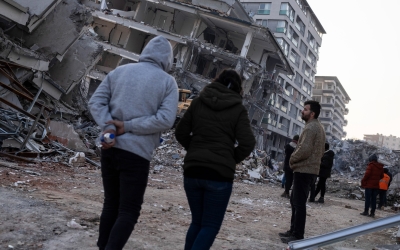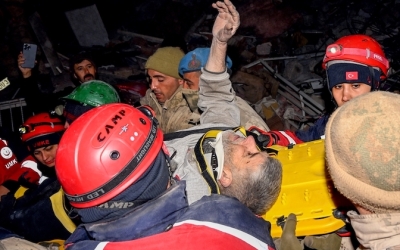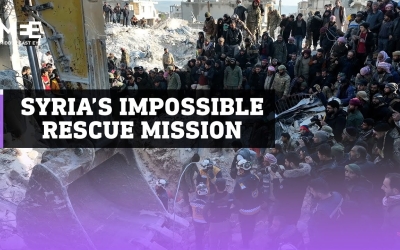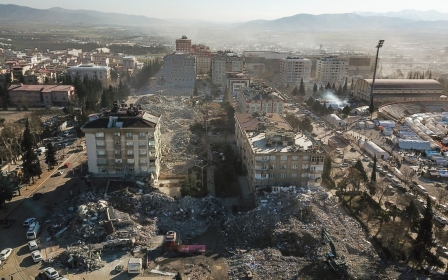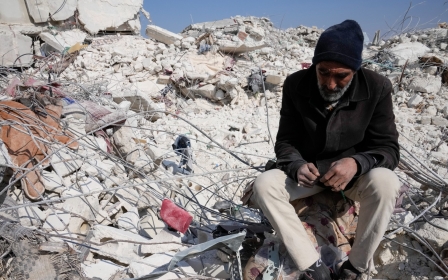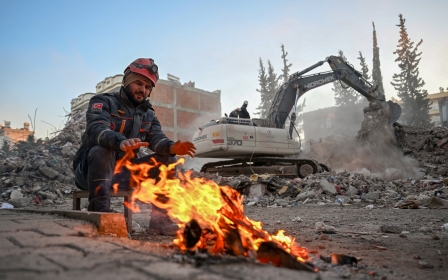Turkey earthquake: Building practices and government under fire as death toll mounts
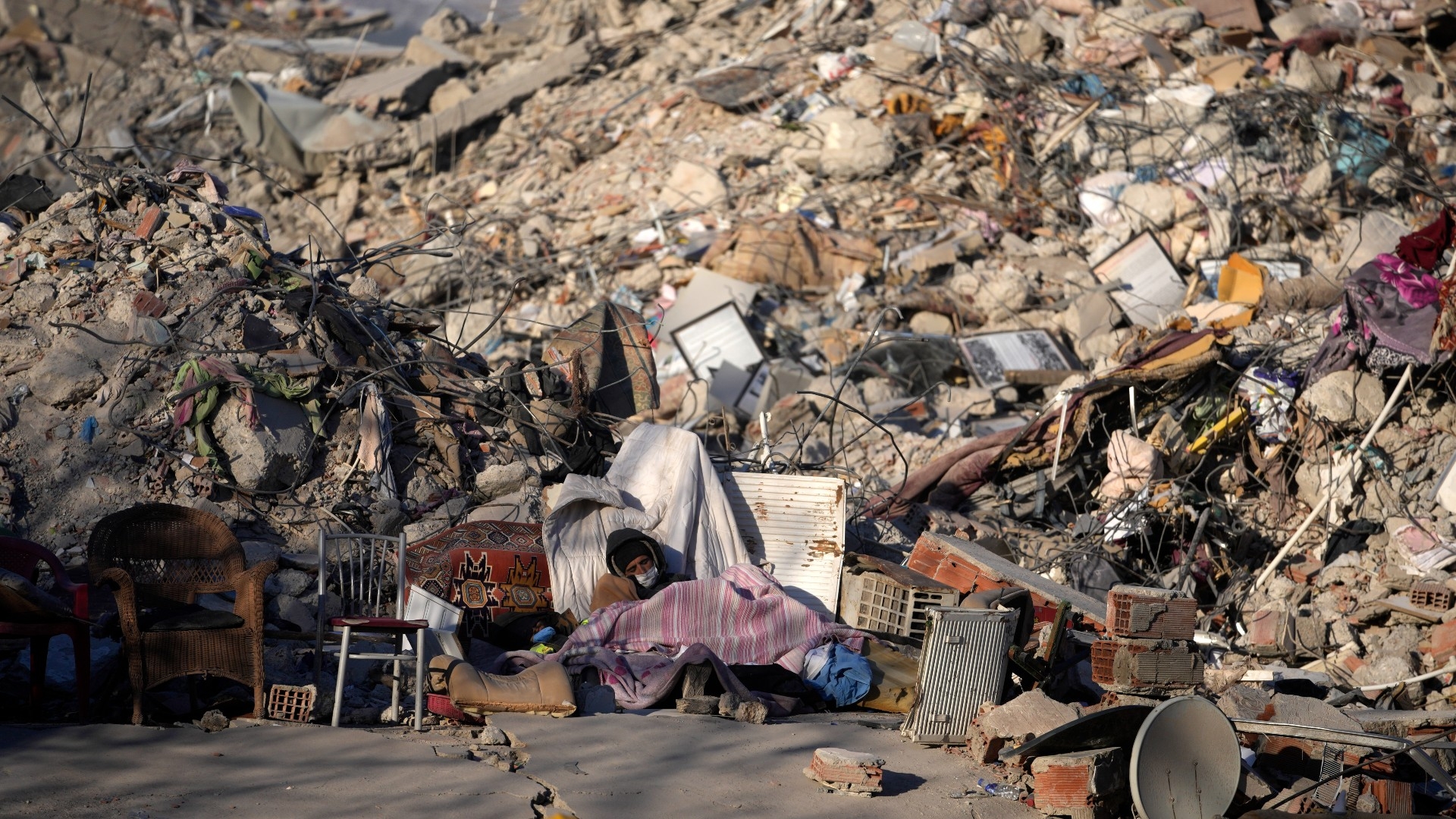
The mounting death toll in Turkey after Monday's devastating earthquake has raised questions over the country's building standards, with anger growing over shoddy and illegal construction methods as well as flaws in the building process itself.
In the southeastern Turkish city of Kahramanmaras, one of the closest to the epicentre that devastated much of this region, most of the survivors poured scorn on building contractors while others directed their anger at the central and local government over alleged failures in building inspection.
"If there was a fault line just beneath this street, why did they allow the construction of multi-storey buildings here?" a woman could be heard crying out in front of one of the many levelled buildings.
"Yes, the state is here, together with us. We have food, water, heater. But where is my son? Where are my grandchildren?" asked the same woman. "It was the government, which has not carried out necessary inspections on our buildings."
'May Allah curse the contractors'
- Ahmet Turan, whose home was levelled by the quake
In this sprawling city, which had a population of more than one million before the disaster, rescuers, including crews from dozens of countries, continued to search the rubble on Tuesday in the hope of finding people alive, even though the odds are against them.
New MEE newsletter: Jerusalem Dispatch
Sign up to get the latest insights and analysis on Israel-Palestine, alongside Turkey Unpacked and other MEE newsletters
Thermal cameras were used to probe the piles of concrete and metal in many of the stricken regions, while rescuers demanded silence so that they could hear the voices of the trapped.
According to Turkey's environment and urban planning minister Murat Kurum, at least one million individual building units have been damaged with teams so far searching through more than 17,000 buildings.
The death toll reached 31,974 in Turkey on Tuesday, according to the country's crisis management agency. In Syria, 3,553 people have died, data from state media in regime-controlled parts of the country and civil defence forces in rebel-held areas showed.
'They ruined the country'
Standing near another pancaked building, resident Ahmet Turan rallied others like him who were rendered homeless by the quake, lashing out verbally at unscrupulous contractors.
"May Allah curse the contractors," Turan bellowed. "Look at this building. Look at the cement and other materials. Which of them is usable in such a big building?" he said
Another man quickly interjected, saying: "They [the contractors] are never satisfied with what they earn. They just want more. They ruined the country."
Even though Turkey has construction codes that meet current earthquake-engineering standards, they are too rarely enforced, explaining why thousands of buildings may have collapsed.
The Turkish government has vowed to punish anyone responsible, with prosecutors gathering samples of buildings for evidence on materials used during construction.
Over the weekend the justice ministry announced plans to establish an earthquake crimes investigation bureau. The entity would aim to identify contractors and others responsible for building works; gather evidence; instruct experts, including architects, geologists and engineers; and check building permits and occupation permits.
"Prosecutors have been instructed to find the contractors of the collapsed buildings as well as other responsible people," the ministry said in a written statement.
"They will not be allowed to flee."
Contractors arrested
Since the disaster, more than 100 contractors have been arrested across Turkey and abroad, including one who was detained in Northern Cyprus and extradited to the mainland, while another was detained at Istanbul Airport ahead of his flight to Montenegro.
"What about the others?" Turan asked.
"They say at least 7,000 buildings collapsed [in this area]. The death penalty must come back and be applied to these contractors."
The disaster comes three months before elections that many analysts had expected to be President Recep Tayyip Erdogan's toughest in his two decades in power.
Erdogan is facing a growing backlash for overseeing a sweeping 2018 amnesty programme that forgave faults in millions of buildings across Turkey.
In one video that has now gone viral, Erdogan listed some of his government's top achievements during a campaign stop ahead of Turkey's March 2019 local elections.
"We solved the problem of 144,156 citizens of Maras with zoning amnesty," Erdogan said, using his term for the construction amnesties which legalised older sub-standard buildings that were erected without the proper permits and placed the responsibility for earthquake readiness on property owners.
Coincidentally, Turkey's parliament was scheduled to discuss another zoning amnesty on 6 February, the day the twin earthquakes struck.
'Invitation to death'
Public anger and economic problems, partly caused by the 1999 quake, had helped catapult Erdogan's AK Party into power in 2002, which had promised a clean start free from the endemic corruption of the past.
The party embarked on a programme of massive infrastructure projects - new airports, ports, roads, railways and public housing projects sprang up across the country, contributing to Turkey's significant economic success.
"Human life has no importance in this country," Turan said, as he shook his head.
"Did anything change in Istanbul after the 1999 earthquake?" he said, referring to the 7.4 magnitude earthquake which struck in Golcuk, near the Marmara Sea.
Others said it was difficult to ascertain how many of the buildings that came down may have benefited from the amnesty, but a 2020 report by Hatay University academic Ali Utku Sahin stated a possible earthquake in Hatay province, which includes Kahramanmaras, could level as many as 52,000 buildings, killing at least 30,000 people.
Even the Disaster and Emergency Management Presidency (AFAD), which reports to the Interior Ministry, said in 2020 that Kahramanmaras was not prepared for an earthquake.
Erdogan has acknowledged some initial problems with the country's response to the earthquake, but has maintained that no government could be ready for a disaster of this magnitude.
But the country's main association of engineers and architects has weighed in with a scathing attack on the practice of amnesties for builders. It stated: "Zoning amnesty is an invitation to death."
"In our country, zoning amnesties have been one of the most important incentives for illegal construction and have made it uncertain for the society to live in healthy and safe houses." The group said the practice is used "for the sake of political gain", and must be stopped.
This article is available in French on Middle East Eye French edition.
Middle East Eye delivers independent and unrivalled coverage and analysis of the Middle East, North Africa and beyond. To learn more about republishing this content and the associated fees, please fill out this form. More about MEE can be found here.


